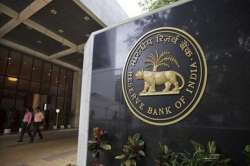The government has cited the never-before-used power of issuing directions to RBI Governor to seek a resolution to differences with the central bank, sources with knowledge of the development said.
The government has sent at least three letters on different issues under Section 7 (1) of the Reserve Bank of India Act that gives it powers to issue any direction to the central bank governor on matters of public interest.
Sources, however, insisted that the government has not taken any action of issuing any specific direction and has only initiated consultations with the central bank on unresolved issues.
Finance Ministry and RBI are said to have differed on the central bank's handling of weak public sector banks, tight liquidity in the market and ways of resolving bad loans in the power sector.
Sources said the finance ministry wrote three separate letters in the past few weeks to RBI on issues ranging from Prompt Corrective Action (PCA) framework to liquidity management and sought consultation under Section 7 of the RBI Act.
The government wants RBI to carve out exemption for power companies under the PCA framework that outlines triggers for declaring a loan account as stressed or NPA, sources said adding the second letter pertained to use of RBI's capital reserves for providing liquidity to the market and a third letter was for relaxing constraints on banks for loans to small and medium enterprises (SMEs).
Section 7 of the RBI Act empowers the government to issue directions to the central bank, after consultation with RBI Governor, on issues that it considers serious and of public interest. This section has never been invoked before.
Sources said Section 7 has two parts - consultation and then issuing a direction to RBI for taking some action in public interest.
Right now only consultations are on, which may or may not result in any direction being issued, sources said.
It is being speculated that RBI Governor Urjit Patel may choose to resign if a specific direction is issued to the central bank under Section 7.
Former Finance Minister and senior Congress leader P Chidambaram warned of "more bad news" if indeed the government were to invoke Section 7 of the RBI Act.
If the move was indeed true, it showed that the government was 'desperate' and was hiding facts about the economy, he said adding the previous UPA government did not invoke Section 7 prior to liberalisation of the economy in 1991, the Asian financial crisis of 1997 or the period after the recession in 2008.
"If, as reported, the government has invoked Section 7 of the RBI Act and issued unprecedented 'directions' to the RBI, I am afraid there will be more bad news today. We did not invoke Section 7 in 1991 or 1997 or 2008 or 2013. What is the need to invoke the provision now? It shows that the government is hiding facts about the economy and is desperate," he tweeted.
Sources said never in the history of RBI has a direction under Section 7 of RBI Act been issued to the central bank.
The letters seeking consultation under Section 7 apparently prompted RBI Deputy Governor Viral Acharya's hard-hitting speech on Friday, in which he warned that toying with the central bank’s independence could lead to dire consequences.
He had warned that undermining RBI's independence could be "potentially catastrophic", indicating the central bank is being pushed to relax its policies and reduce its powers ahead of a general election due by May.
Latest India News
